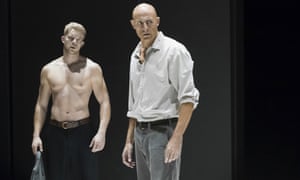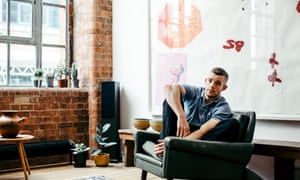I’M a Footballer and Not Gay but Only on the Movie “The Pass”
I’m a footballer,” laughs Russell Tovey’s character in his new film, The Pass. “Of course I’m not gay.” The week we meet, in the London flat where Tovey lives with his French bulldog Rocky and a rotating collection of contemporary art, Premier League football teams across the UK are playing in rainbow laces to support Stonewall. On Facebook, a cascade of homophobia appears under images of the campaign, fans commenting that they are withdrawing their support of clubs they’d loved all their lives, that they’re a disgrace, disgusting, evil. Seeing this, it’s perhaps unsurprising there are no out gay players in the premiership. Tovey’s hope is that one might accidentally stumble into a screening of the film and emerge, changed.
A story set in three hotel rooms over 12 years, The Pass was inspired by a photograph of Manchester United’s FA Youth Cup-winning team from 1992. Paul Scholes and David Beckham stand beside the anonymous boys who dropped out of the game soon after. “I started thinking about the notion of a golden period of your life,” says writer John Donnelly, “from which you can never quite escape.” He wondered whether the boys who don’t make it are always the ones filled with regret.
First staged at the Royal Court, The Pass is a game of three halves, a love story that nods at the tragedy of Justin Fashanu, who killed himself in 1998 after becoming the first player to publicly come out. It starts with two boys at the beginning of their career and ends with Tovey as a superstar footballer, the other, happy. Tovey was seduced by the description of a “sporty Hamlet”; Donnelly wrote the part of Jason with him in mind. “He’s such a terrific actor, Russell,” he tells me later, “and a classic Essex boy – charming, warm, gregarious, with this incredible sensitivity. And Jason really needs that because there are monstrous elements to his character.” He needed an actor an audience wanted to like, and Tovey has that special gleam, a charisma that fills his huge warehouse apartment like smoke.
Out in the world, though, he’s fairly anonymous – walking through London he says, people only see his dog. “I only get recognised if I wear blue,” Tovey confides. “I don’t know why. But if I’m feeling needy I wear an electric blue suit.” It helped, too, that for a character who spends much of the story in his underpants, he was willing to work out. Today Tovey is fully dressed, bright and relaxed after flying in from New York where he’s shooting the crime drama series Quantico – Google it with his name, and the first page of results are blogs about his character going topless. At 35, bounding through the flat, he appears more puppyish even than his bulldog.
Born in Billericay to parents who run a coach company, Tovey was first noticed for roles in The History Boys and the BBC’s Him & Her. But around his 30th birthday, something changed: Tovey (out since he was 18) started playing gay. “It wasn’t a conscious decision,” he says, “and it was only the other day that I realised it had been important somehow. For so long, as a young actor, I had this anxiety about making sure I could get straight roles, and now I know that’s not necessary. The gay roles are the best for me. Being gay has made my career.” As well as The Pass, he excelled in HBO’s Looking, about a group of men in San Francisco discovering the complexities of contemporary gay relationships; he plays a gay man in Quantico; next year he stars in Angels in America, and recently he appeared on Broadway as Rodolpho in Arthur Miller’s A View from the Bridge. “And it’s made me realise that just like there’s not just one way to play a straight person, or one story to tell, there are a billion fascinating wonderful stories to tell with gay characters. A billion adventures to have.”
Last year, he casually suggested he had benefited from not going to drama school, suggesting it would have made him “prance around” being “effeminate”. He was unprepared for the backlash, for the accusations of internalised homophobia, and winces a little as he remembers. Being out, and in the public eye, he realised then, “meant I had a responsibility. If I’m going to be seen as a ‘pioneer’, a gay man and a performer, I need to make sure I put out a positive message.” He raps his knuckles on the table for emphasis. “Things are great for me, and I want to show that’s possible.”
It’s a message that runs through The Pass, too, a film in which Tovey says he’s given his best performance yet, despite knowing nothing about football. He knew enough, though, to understand that homophobia still runs through the sport like a poisoned stream. “If a premiership footballer came out now it would be a wonderful thing, and I hope one is brave enough to, but it would inevitably eclipse their entire career, wouldn’t it? It would take a brave man to take that on, to take on the chants,” Tovey says, shaking his head. Even Greg Clarke, the FA chairman, said he doesn’t think football is ready for a gay player to come out, adding that it might be a “year or two” before it’s safe.
Rangers midfielder Joey Barton has also admitted that, in the stands, if you “pull out of a tackle you’re a ‘poof’,” while players use homophobic insults in the training ground. “It’s this off-the-cuff linguistic intolerance and thoughtlessness that makes the football industry in general, and football stadiums specifically, so intimidating for LGBT fans,” Barton wrote on his blog in 2014. “I can’t imagine a gay couple feeling so comfortable that they’d be happy to wander down Wembley Way hand in hand, can you?” he continued. However it’s one thing for straight footballers to point out homophobia, adds Donnelly, but quite another for them to change. “It has the effect of pushing the blame on to fans and gay players themselves. Clubs need to be much more active in saying the game needs gay fans, it needs gay players at all levels, what can we do to change this?”
In preparation for the role, Tovey went to an Arsenal game with friends. Donnelly, a huge football fan, was relieved when Tovey told him he was blown away by the atmosphere – that he got it: the “gladiatorial, visceral thrill”. “I had a season ticket to watch Southampton at The Dell,” remembers Donnelly. “I grew up never knowing my dad, and on some level it was a place to observe men.” If the story started with the photograph, it ended with Donnelly and Tovey questioning what it means to be a man. “Rates of depression in young men are sky high, and an inability to share who you are is a part of that. The extent of how hard that is – for young male athletes to open up emotionally – shocked me,” Donnelly says.
“This feels like a really important film,” Tovey says. “My character has it all, but is hollow, while the other guy [played by Arinze Kene] can sit in the pub and hold hands with his boyfriend. That is the happy ending. There is a person who is living his life, knowing who he is. The other man is ruined, because he has never accepted it. It’s a tragic thought. And it makes me feel even luckier, because I’ve never had to hide who I am.” He gives a lopsided smile, embarrassed suddenly.
Today, Tovey says he feels a “calmness”. “When I was younger, towards the end of History Boys, my ambition was sky high. For many years I was chasing, chasing… Now I let it go and realise things will come to me. Everything’s built up to the performance in this film.” There’s still ambition there though. He wants to play a superhero. He wants to work with Mike Leigh. He wants to do a Pinter play on Broadway. “I want to be pushed into dramatic, painful roles I can explore.” He thinks for a second. “I read about an actor who heard an accident on the street, and ran down the stairs to help. But on the way down, there was a mirror. And he stopped, to see what he looked like. I’m not as bad as that, but I do have emotional recall of moments in my life – I want to use them.”
Which moments? “My nan’s funeral. The moment my parents told me she had died. When the horse and cart turned up, the noise my auntie made.” His eyes fill with tears. “See? We had a dog called Tasha who had to be put down when I was five. Dad went into the vet, and when he got back in the car he started crying.” His voice cracks, and I wait. “There’s a detachment there, because I remember thinking, ‘You’ll have this for ever.’”
Does that mean he wasn’t experiencing it at the time? He was saving it? “I do have that ability to compartmentalise my feelings. But you need to live to be able to portray someone else living. I live!” It sounds a little like he’s boasting, and he chuckles. “I live through art, too.”
He travels now, not just for work, but to visit small galleries he’s interested in – his whole demeanour changes when he talks about art, slowly, with purpose. He takes me on a tour of his collection: the ceramics in the kitchen, a huge graphite drawing that glitters in sunlight. When he received his first cheque for The History Boys his parents were bemused by his decision to spend it on a Tracey Emin monoprint. You get the impression he enjoys playing with people’s expectations of him – an Essex boy who is proudly out, a six-packed actor obsessed with conceptual art, a pin-up who is looking forward to a murder-mystery party on New Year’s Eve. “And I live through my mates, my boyfriend, family, my dog. You need the real stuff.”
The other day he was organising a quiz night with his mates, thinking of funny names for their team, “And I was like, ‘But we can’t be too rude because there’ll be adults there.’” It wasn’t until his friends snorted with laughter that he remembered he is 35. “Does anyone really feel like an adult? I mean, I have moments. I know who I am now. Having a dog – a responsibility for a living thing. I think about him all the time. That’s made me grow up.” At the sound of his name, Rocky patters over to Tovey, who lifts him on to his lap. “I worked hard on raising him. When he was a puppy, Rocky used to eat his own shit. I had to feed him pineapple so the shit would taste citric and he’d stop. But it just made him love pineapple.” He giggles.
What matters to him is that people see this film. “How can we get people in?” he wonders. “The ones who really need it?” The closeted boys, the people terrified to be honest with their families, the famous man dying inside. His eyes open wide, and he leans forward. “I know,” he says. “Lie. Write that it’s a football hooligan movie. ” OK, I say. It’s a football hooligan movie. You’ll love it.
The Pass is out now in cinemas nationwide



Comments